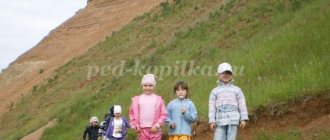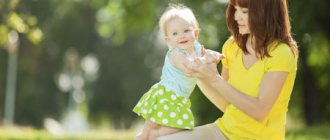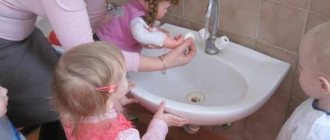Theme of the weeks and content of activities
1st week
“What is hardening?”: getting ideas about hardening, the benefits of hardening for the human body.
Contents of the activity: viewing paintings and talking about their content; role-playing game “For health in kindergarten”; printed board game “Towards the road to health.
2nd week
“How can you harden?”: introduction to different types and methods of hardening.
Contents of the activity: printed board game “Name and Show”; quiz “Who knows more about hardening?”
3rd week
“Walk”: gaining knowledge about air hardening, the need for annual walks in the fresh air, ideas about exercises for the development of hardening nasal breathing.
Contents of the activity: viewing the paintings “Walks in different places” and talking about their content; reading (the poem “Walk” by A. Barto); experiment “Why is it more useful to breathe through your nose while walking?”
4th week
“Country of Hardening” (collective compilation of fairy tales and stories about hardening): the formation of a conscious attitude towards hardening, the ability to react emotionally to hardening events and actively participate in them (with the desire to talk about hardening)
Contents of the activity: inventing riddles about hardening; listening to a fairy tale; joint activity with parents “Tempering with Mom.”
5th week
“The sun, air and water are our best friends!”: introduction to the rules of hardening the body with the help of natural factors, various hardening procedures.
Contents of the activity: examination of the illustrations “Morning. Running", "In training"; reading the proverb “Sun, air and water always help us”; drawing “Oh, healthy water!”; creation of the album “Hardening with Mom and Dad”; excursion with parents to the “Healthy Gallery”.
Socially significant project “It’s easy to be healthy!”
"Healthy Eating"
Parents have to come up with a lot of things to get their beloved baby to eat. And this capricious gourmand only knows that he is dodging the spoon. So how do you get your child to eat every last spoonful?
One of the most common mistakes parents make is to offer their child sweet fruit juices or milk instead of water when he asks for a drink. After all, the sugar included in these drinks reduces appetite.
A few simple tips:
Make a holiday out of your meal! During a meal, the emotional atmosphere is very important. Breakfasts, lunches, and dinners should not be used as an opportunity to punish or criticize a child for disobedience.
Try to feed your baby in the kitchen, where you eat yourself. Children are more likely to eat food if they see their parents eating and enjoying the food themselves. If your baby sees you happily eating carrots or pureed vegetables, he thinks it’s delicious and will be more likely to try such food in the future.
Do not try to force your child to eat more than he can. This can form an undesirable habit for him to put food in his mouth and keep it there without swallowing.
If possible, let your child try everything that is not forbidden to him at this age - this will only increase his interest in food.
Forcing a child to constantly eat any dish is wrong - you will only increase the rejection of this dish.
"Optimal motor mode"
The child has a strong need to move. The child receives the basis for successful mastery of motor skills in systematic physical education classes. However, the improvement and sustainability of the acquired skills, and the child’s independent application of them in various living conditions cannot be achieved only through classes alone.
In addition to daily morning exercises and a certain number of physical education classes in preschool educational institutions, it is necessary to provide children with the opportunity to exercise independently. For this, it is best to use outdoor games.
“Don’t be lazy to harden yourself!”
If you want to see your child healthy, you must constantly, every day, devote time to hardening procedures. The “minimum” of hardening includes the mandatory use of non-overheating clothing, air and water procedures, and hygiene of clothing and shoes. Next we will talk about the role of walks in the life of preschoolers.
“The role of a walk in the life of a preschooler”
In our kindergarten, great attention is paid to the proper organization of walks in the preschooler’s daily routine. Children's stay in the fresh air is of great importance for the physical development of a preschooler. Since the growing body’s need for oxygen is more than 2 times greater than that of adults, walking is the first and most accessible means of hardening a child’s body. It helps to increase the child’s endurance and resistance to adverse environmental influences, especially colds. Our kindergarten students play a lot and move around during walks. Movement increases metabolism, blood circulation, gas exchange, and improves appetite. They develop motor skills and abilities, strengthen the muscular system, and increase vitality.
Pedagogical project “Grow up healthy, baby!”
Administration of the City District of Podolsk
Education Committee
Municipal preschool educational institution
general developmental kindergarten No. 10
Moscow region, Podolsk, st. Chistova, 13A, t. 8(4967) 53-52-65
e-mail: [email protected]
_____________________________________________________________________________
Pedagogical project for children of the second group of early age
“Grow up healthy, baby!”
prepared:
kindergarten teacher
kindergarten No. 10
Kazaeva S.V.
G.o. Podolsk 2021
Project “Grow up healthy, baby!” (second group of early age).
Compiled by Svetlana Kazaeva, teacher of MDOU d/c No. 10
G.o. Podolsk 2021.
Project type
: practice-oriented
Project type
: information and game
Project duration
: short-term
Project participants
: pupils of the second junior group, teachers, parents.
Objective of the project
: preserving and strengthening the health of children, introducing pupils and their parents to a healthy lifestyle.
Tasks:
1. Expand children’s understanding of personal hygiene items and rules
using them.
2. Cultivate neatness and the habit of taking care of your appearance.
3. To instill neatness in children, to instill cultural and hygienic skills and simple self-service skills.
4. Cultivate a desire to be healthy and take good care of yourself.
5. To form a desire to lead a healthy lifestyle, to give ideas about the value of health.
Expected results of the project:
— Preservation and strengthening of children’s health through a system of comprehensive physical education and health work;
— Creation of a subject-based development environment that ensures the effectiveness of health-improving work;
— Active involvement of parents in the physical education and health activities of preschool educational institutions;
— Improving independence skills in children while observing cultural and hygienic procedures.
— Formation in children and parents of the desire and desire to lead a healthy lifestyle.
Preliminary work
: looking at illustrations of objects
personal hygiene, creating game situations for using personal hygiene items, reading literary works about hygiene, guessing riddles.
Relevance of the project
Health is a priceless gift that nature gives to man.
A healthy child is characterized by harmonious, age-appropriate physical, intellectual, emotional-volitional, moral and social development. Preschool age is sensitive for the formation of the foundation of physical and mental health.
In early preschool age, there is intensive development of organs and the formation of functional systems of the body, the basic personality traits, attitude towards oneself and others are laid. It is important at this stage to form a knowledge base and practical skills for a healthy lifestyle in children.
Project "Happy Children - Healthy Children"
Currently, the state of health of children in our country is of serious concern to society. According to the Research Institute of Hygiene and Health Protection of Children and Adolescents of the National Center of Economics of the Russian Academy of Medical Sciences, in Russia, 60% of children aged 3 to 7 years have functional health problems and only 10% of children come to school absolutely healthy. Unfavorable environmental conditions lead to weakened immunity, and, as a result, to an increase in colds and infections. In an educational institution and at home, children spend most of their time in a static position (at the table, in front of the TV, computer, etc.) This increases the static load on certain muscle groups and causes them to fatigue. The strength and performance of skeletal muscles decreases, which leads to poor posture, curvature of the spine, and flat feet.Everyone knows that even the best physical education and health program will not be able to give full results if it is not implemented together with the family, if a child-adult community (children - parents - teachers) is not created in the preschool institution, which is characterized by assistance to each other, consideration the capabilities and interests of everyone, their rights and responsibilities.
The Concept of Preschool Education emphasizes: “The family and kindergarten are chronologically connected by a form of continuity, which facilitates the continuity of the upbringing and education of children. However, a preschooler is not a baton that the family passes into the hands of teachers. What is important here is not the principle of parallelism, but the principle of interpenetration of two social institutions. The most important condition for continuity is the establishment of trusting business contact between the family and the kindergarten, during which the educational position of parents and teachers is adjusted.”
In the last decade, serious problems have emerged in the relationship between parents and children. Psychological and pedagogical research by leading domestic and foreign experts (A.A. Bodaleva, L.V. Vygotsky, K. Rogers, etc.) proves that disruption of a child’s emotional contacts with parents negatively affects the child’s somatic, intellectual and physical development. As a result of studying the characteristics of emotional relationships between parents and children of preschool educational institutions, it was found: 70% of parents do not understand the importance of positive contact with children; parents do not realize that disruption of emotional connections negatively affects the child’s psychophysical development; in every second family, emotional connections are disrupted (children experience a lack of parental love, attention, warmth and affection).
A survey of parents of children who attend kindergarten showed that parents have insufficient knowledge of how to strengthen their child’s health through physical exercise, hardening, and outdoor games. They often protect their children from physical exertion (“don’t run, don’t jump, don’t climb, otherwise you’ll fall, sit”), even from healthy competition in outdoor games.
It is necessary to organize the interaction of group teachers and physical education instructors with parents to create an effective system of cooperation. It is the parents who make up the child’s first social environment and are the main educators, on whose position the child’s development largely depends.




